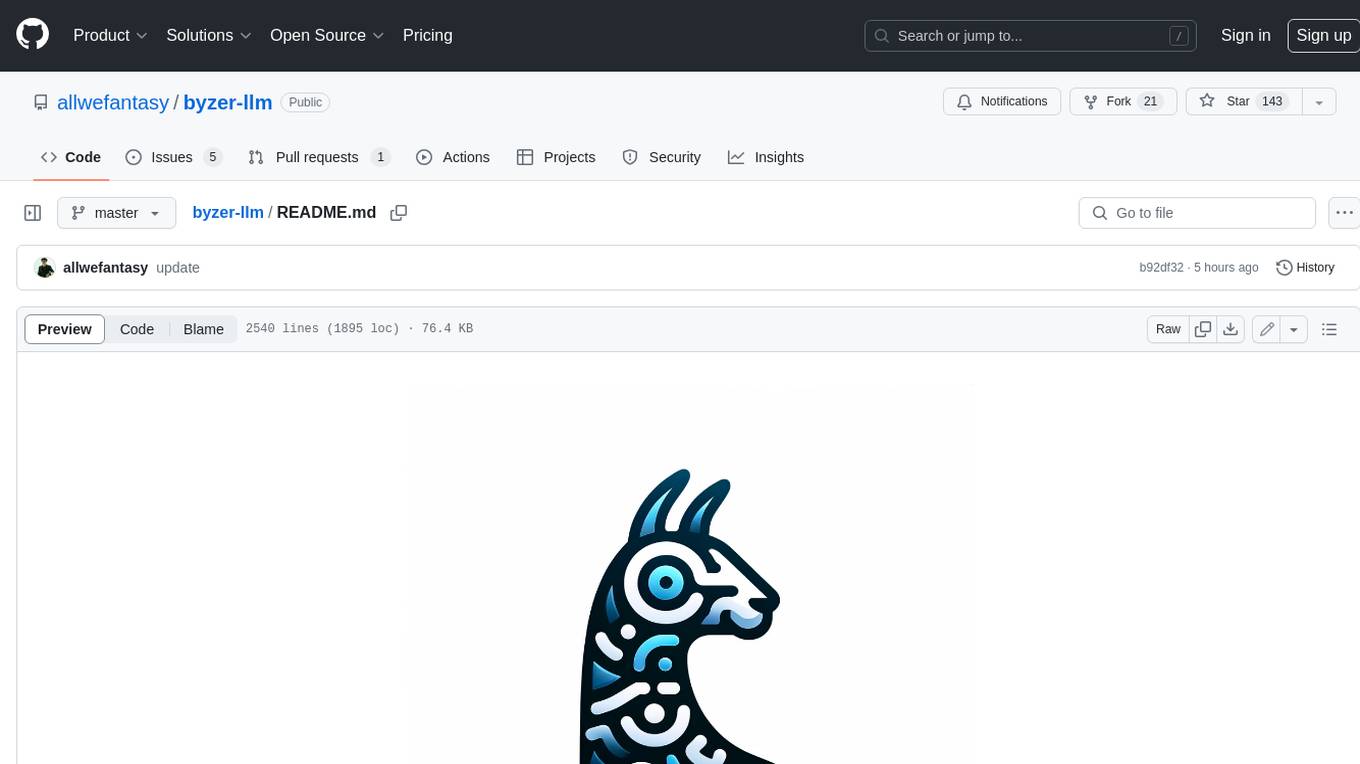
Webscout
Webscout is the all-in-one search and AI toolkit you need. Discover insights with Yep.com, DuckDuckGo, and Phind; access cutting-edge AI models; transcribe YouTube videos; generate temporary emails and phone numbers; perform text-to-speech conversions; and much more!
Stars: 210
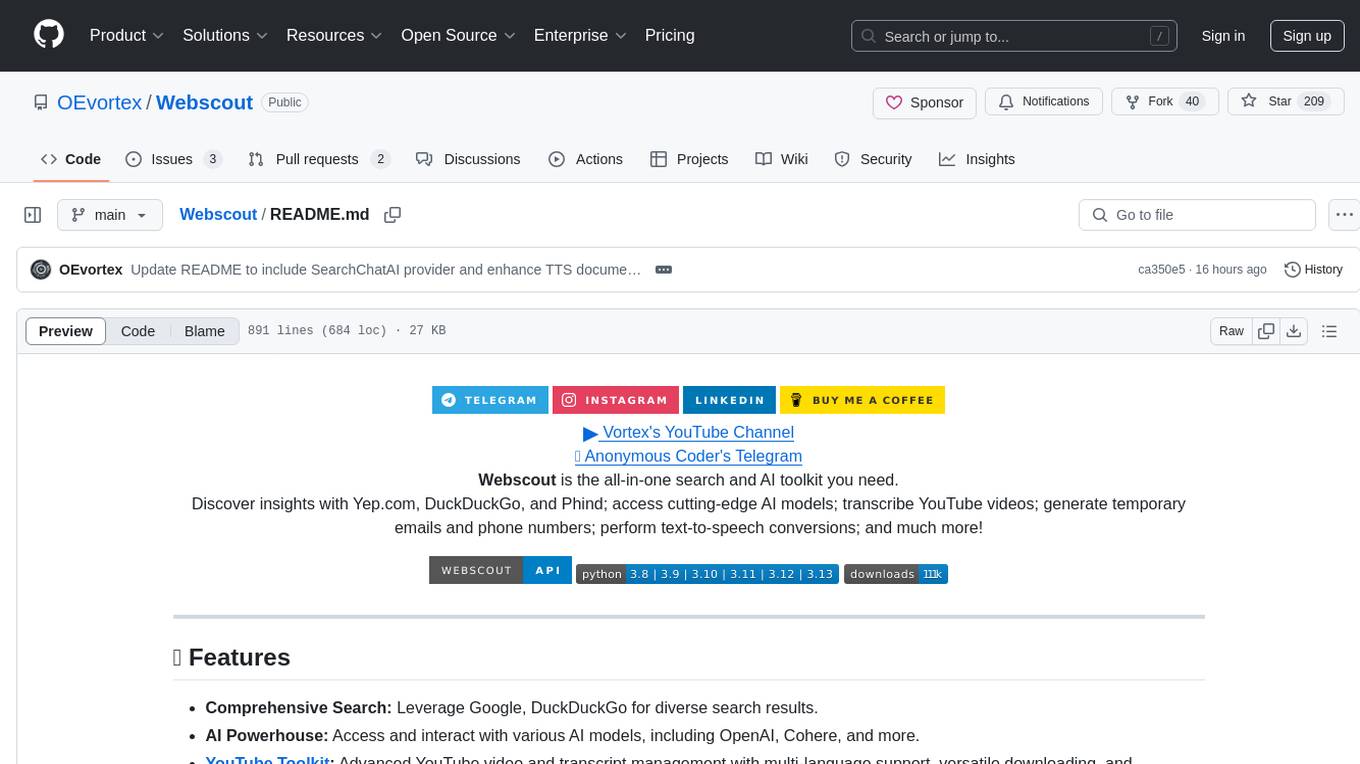
Webscout is an all-in-one Python toolkit for web search, AI interaction, digital utilities, and more. It provides access to diverse search engines, cutting-edge AI models, temporary communication tools, media utilities, developer helpers, and powerful CLI interfaces through a unified library. With features like comprehensive search leveraging Google and DuckDuckGo, AI powerhouse for accessing various AI models, YouTube toolkit for video and transcript management, GitAPI for GitHub data extraction, Tempmail & Temp Number for privacy, Text-to-Speech conversion, GGUF conversion & quantization, SwiftCLI for CLI interfaces, LitPrinter for styled console output, LitLogger for logging, LitAgent for user agent generation, Text-to-Image generation, Scout for web parsing and crawling, Awesome Prompts for specialized tasks, Weather Toolkit, and AI Search Providers.
README:

Your All-in-One Python Toolkit for Web Search, AI Interaction, Digital Utilities, and More.
Access diverse search engines, cutting-edge AI models, temporary communication tools, media utilities, developer helpers, and powerful CLI interfaces – all through one unified library.
- Comprehensive Search: Leverage Google, DuckDuckGo for diverse search results.
- AI Powerhouse: Access and interact with various AI models, including OpenAI, Cohere, and more.
- YouTube Toolkit: Advanced YouTube video and transcript management with multi-language support, versatile downloading, and intelligent data extraction
- GitAPI: Powerful GitHub data extraction toolkit for seamless repository and user information retrieval, featuring commit tracking, issue management, and comprehensive user analytics - all without authentication requirements for public data
- Tempmail & Temp Number: Generate temporary email addresses and phone numbers for enhanced privacy.
- Text-to-Speech (TTS): Convert text into natural-sounding speech using multiple AI-powered providers like ElevenLabs, StreamElements, and Voicepods.
- GGUF Conversion & Quantization: Convert and quantize Hugging Face models to GGUF format.
- SwiftCLI: A powerful and elegant CLI framework that makes it easy to create beautiful command-line interfaces.
- LitPrinter: Provides beautiful, styled console output with rich formatting and colors
- LitLogger: Simplifies logging with customizable formats and color schemes
- LitAgent: Powerful and modern user agent generator that keeps your requests fresh and undetectable
- Text-to-Image: Generate high-quality images using a wide range of AI art providers
- Scout: Advanced web parsing and crawling library with intelligent HTML/XML parsing, web crawling, and Markdown conversion
- Awesome Prompts (Act): A curated collection of system prompts designed to transform Webscout into specialized personas, enhancing its ability to assist with specific tasks. Simply prefix your request with the act name or index number to leverage these tailored capabilities.
- Weather Tool kit Webscout provides tools to retrieve weather information.
- AIsearch AI Search Providers offer powerful and flexible AI-powered search Search Engine
pip install -U webscoutpython -m webscout --help| Command | Description |
|---|---|
| python -m webscout answers -k Text | CLI function to perform an answers search using Webscout. |
| python -m webscout chat | Interactive AI chat using DuckDuckGo's AI. |
| python -m webscout images -k Text | CLI function to perform an images search using Webscout. |
| python -m webscout maps -k Text | CLI function to perform a maps search using Webscout. |
| python -m webscout news -k Text | CLI function to perform a news search using Webscout. |
| python -m webscout suggestions -k Text | CLI function to perform a suggestions search using Webscout. |
| python -m webscout text -k Text | CLI function to perform a text search using Webscout. |
| python -m webscout translate -k Text | CLI function to perform translate using Webscout. |
| python -m webscout version | A command-line interface command that prints and returns the version of the program. |
| python -m webscout videos -k Text | CLI function to perform a videos search using DuckDuckGo API. |
| python -m webscout weather -l qazigund | CLI function to get weather information for a location using Webscout. |
import json
import asyncio
from webscout import VNEngine
from webscout import TempMail
async def main():
vn = VNEngine()
countries = vn.get_online_countries()
if countries:
country = countries[0]['country']
numbers = vn.get_country_numbers(country)
if numbers:
number = numbers[0]['full_number']
inbox = vn.get_number_inbox(country, number)
# Serialize inbox data to JSON string
json_data = json.dumps(inbox, ensure_ascii=False, indent=4)
# Print with UTF-8 encoding
print(json_data)
async with TempMail() as client:
domains = await client.get_domains()
print("Available Domains:", domains)
email_response = await client.create_email(alias="testuser")
print("Created Email:", email_response)
messages = await client.get_messages(email_response.email)
print("Messages:", messages)
await client.delete_email(email_response.email, email_response.token)
print("Email Deleted")
if __name__ == "__main__":
asyncio.run(main())...
from webscout import YepSearch
# Initialize YepSearch
yep = YepSearch(
timeout=20, # Optional: Set custom timeout
proxies=None, # Optional: Use proxies
verify=True # Optional: SSL verification
)
# Text Search
text_results = yep.text(
keywords="artificial intelligence",
region="all", # Optional: Region for results
safesearch="moderate", # Optional: "on", "moderate", "off"
max_results=10 # Optional: Limit number of results
)
print(text_results)
# Image Search
image_results = yep.images(
keywords="nature photography",
region="all",
safesearch="moderate",
max_results=10
)
print(image_results)
# Suggestions
suggestions = yep.suggestions("hist")
print(suggestions)from webscout import GoogleSearch
# Initialize GoogleSearch
google = GoogleSearch(
timeout=10, # Optional: Set custom timeout
proxies=None, # Optional: Use proxies
verify=True # Optional: SSL verification
)
# Text Search
text_results = google.text(
keywords="artificial intelligence",
region="us", # Optional: Region for results
safesearch="moderate", # Optional: "on", "moderate", "off"
max_results=10 # Optional: Limit number of results
)
for result in text_results:
print(f"Title: {result.title}")
print(f"URL: {result.url}")
print(f"Description: {result.description}")
print("---")
# News Search
news_results = google.news(
keywords="technology trends",
region="us",
safesearch="moderate",
max_results=5
)
for result in news_results:
print(f"Title: {result.title}")
print(f"URL: {result.url}")
print(f"Description: {result.description}")
print("---")
# Get search suggestions
suggestions = google.suggestions("how to")
print(suggestions)
# Legacy usage is still supported
from webscout import search
results = search("Python programming", num_results=5)
for url in results:
print(url)The WEBS and AsyncWEBS classes are used to retrieve search results from DuckDuckGo.com.
To use the AsyncWEBS class, you can perform asynchronous operations using Python's asyncio library.
To initialize an instance of the WEBS or AsyncWEBS classes, you can provide the following optional arguments:
Example - WEBS:
from webscout import WEBS
R = WEBS().text("python programming", max_results=5)
print(R)Example - AsyncWEBS:
import asyncio
import logging
import sys
from itertools import chain
from random import shuffle
import requests
from webscout import AsyncWEBS
# If you have proxies, define them here
proxies = None
if sys.platform.lower().startswith("win"):
asyncio.set_event_loop_policy(asyncio.WindowsSelectorEventLoopPolicy())
def get_words():
word_site = "https://www.mit.edu/~ecprice/wordlist.10000"
resp = requests.get(word_site)
words = resp.text.splitlines()
return words
async def aget_results(word):
async with AsyncWEBS(proxies=proxies) as WEBS:
results = await WEBS.text(word, max_results=None)
return results
async def main():
words = get_words()
shuffle(words)
tasks = [aget_results(word) for word in words[:10]]
results = await asyncio.gather(*tasks)
print(f"Done")
for r in chain.from_iterable(results):
print(r)
logging.basicConfig(level=logging.DEBUG)
await main()Important Note: The WEBS and AsyncWEBS classes should always be used as a context manager (with statement). This ensures proper resource management and cleanup, as the context manager will automatically handle opening and closing the HTTP client connection.
Exceptions:
-
WebscoutE: Raised when there is a generic exception during the API request.
from webscout import WEBS
# Text search for 'live free or die' using DuckDuckGo.com
with WEBS() as WEBS:
for r in WEBS.text('live free or die', region='wt-wt', safesearch='off', timelimit='y', max_results=10):
print(r)
for r in WEBS.text('live free or die', region='wt-wt', safesearch='off', timelimit='y', max_results=10):
print(r)from webscout import WEBS
# Instant answers for the query "sun" using DuckDuckGo.com
with WEBS() as WEBS:
for r in WEBS.answers("sun"):
print(r)from webscout import WEBS
# Image search for the keyword 'butterfly' using DuckDuckGo.com
with WEBS() as WEBS:
keywords = 'butterfly'
WEBS_images_gen = WEBS.images(
keywords,
region="wt-wt",
safesearch="off",
size=None,
type_image=None,
layout=None,
license_image=None,
max_results=10,
)
for r in WEBS_images_gen:
print(r)from webscout import WEBS
# Video search for the keyword 'tesla' using DuckDuckGo.com
with WEBS() as WEBS:
keywords = 'tesla'
WEBS_videos_gen = WEBS.videos(
keywords,
region="wt-wt",
safesearch="off",
timelimit="w",
resolution="high",
duration="medium",
max_results=10,
)
for r in WEBS_videos_gen:
print(r)from webscout import WEBS
import datetime
def fetch_news(keywords, timelimit):
news_list = []
with WEBS() as webs_instance:
WEBS_news_gen = webs_instance.news(
keywords,
region="wt-wt",
safesearch="off",
timelimit=timelimit,
max_results=20
)
for r in WEBS_news_gen:
# Convert the date to a human-readable format using datetime
r['date'] = datetime.datetime.fromisoformat(r['date']).strftime('%B %d, %Y')
news_list.append(r)
return news_list
def _format_headlines(news_list, max_headlines: int = 100):
headlines = []
for idx, news_item in enumerate(news_list):
if idx >= max_headlines:
break
new_headline = f"{idx + 1}. {news_item['title'].strip()} "
new_headline += f"(URL: {news_item['url'].strip()}) "
new_headline += f"{news_item['body'].strip()}"
new_headline += "\n"
headlines.append(new_headline)
headlines = "\n".join(headlines)
return headlines
# Example usage
keywords = 'latest AI news'
timelimit = 'd'
news_list = fetch_news(keywords, timelimit)
# Format and print the headlines
formatted_headlines = _format_headlines(news_list)
print(formatted_headlines)from webscout import WEBS
# Map search for the keyword 'school' in 'anantnag' using DuckDuckGo.com
with WEBS() as WEBS:
for r in WEBS.maps("school", place="anantnag", max_results=50):
print(r)from webscout import WEBS
# Translation of the keyword 'school' to German ('hi') using DuckDuckGo.com
with WEBS() as WEBS:
keywords = 'school'
r = WEBS.translate(keywords, to="hi")
print(r)from webscout import WEBS
# Suggestions for the keyword 'fly' using DuckDuckGo.com
with WEBS() as WEBS:
for r in WEBS.suggestions("fly"):
print(r)from webscout import WEBS
# Get weather information for a location using DuckDuckGo.com
with WEBS() as webs:
weather_data = webs.weather("New York")
print(weather_data)Retrieve a comprehensive list of all supported LLMs.
from webscout import model
from rich import print
all_models = model.llm.list()
print("Available models:")
print(all_models)Obtain a summary of the available LLMs, including provider details.
from webscout import model
from rich import print
summary = model.llm.summary()
print("Summary of models:")
print(summary)Filter and display LLMs available from a specific provider.
from webscout import model
from rich import print
provider_name = "PerplexityLabs" # Example provider
available_models = model.llm.get(provider_name)
if isinstance(available_models, list):
print(f"Available models for {provider_name}: {', '.join(available_models)}")
else:
print(f"Available models for {provider_name}: {available_models}")Retrieve a comprehensive list of all supported TTS voices.
from webscout import model
from rich import print
all_voices = model.tts.list()
print("Available TTS voices:")
print(all_voices)Obtain a summary of the available TTS voices, including provider details.
from webscout import model
from rich import print
summary = model.tts.summary()
print("Summary of TTS voices:")
print(summary)Filter and display TTS voices available from a specific provider.
from webscout import model
from rich import print
provider_name = "ElevenlabsTTS" # Example provider
available_voices = model.tts.get(provider_name)
if isinstance(available_voices, list):
print(f"Available voices for {provider_name}: {', '.join(available_voices)}")
elif isinstance(available_voices, dict):
print(f"Available voices for {provider_name}:")
for voice_name, voice_id in available_voices.items():
print(f" - {voice_name}: {voice_id}")
else:
print(f"Available voices for {provider_name}: {available_voices}")from webscout import WEBS as w
R = w().chat("Who are you", model='gpt-4o-mini') # mixtral-8x7b, llama-3.1-70b, claude-3-haiku, gpt-4o-mini
print(R)from webscout import PhindSearch
# Create an instance of the PHIND class
ph = PhindSearch()
# Define a prompt to send to the AI
prompt = "write a essay on phind"
# Use the 'ask' method to send the prompt and receive a response
response = ph.ask(prompt)
# Extract and print the message from the response
message = ph.get_message(response)
print(message)Using phindv2:
from webscout import Phindv2
# Create an instance of the PHIND class
ph = Phindv2()
# Define a prompt to send to the AI
prompt = ""
# Use the 'ask' method to send the prompt and receive a response
response = ph.ask(prompt)
# Extract and print the message from the response
message = ph.get_message(response)
print(message)import webscout
from webscout import GEMINI
from rich import print
COOKIE_FILE = "cookies.json"
# Optional: Provide proxy details if needed
PROXIES = {}
# Initialize GEMINI with cookie file and optional proxies
gemini = GEMINI(cookie_file=COOKIE_FILE, proxy=PROXIES)
# Ask a question and print the response
response = gemini.chat("websearch about HelpingAI and who is its developer")
print(response)from webscout import YEPCHAT
ai = YEPCHAT()
response = ai.chat(input(">>> "))
for chunk in response:
print(chunk, end="", flush=True)from webscout import BLACKBOXAI
from rich import print
ai = BLACKBOXAI(
is_conversation=True,
max_tokens=800,
timeout=30,
intro=None,
filepath=None,
update_file=True,
proxies={},
history_offset=10250,
act=None,
model=None # You can specify a model if needed
)
# Define a prompt to send to the AI
prompt = "Tell me about india"
# Use the 'chat' method to send the prompt and receive a response
r = ai.chat(prompt)
print(r)from webscout import Meta
from rich import print
# **For unauthenticated usage**
meta_ai = Meta()
# Simple text prompt
response = meta_ai.chat("What is the capital of France?")
print(response)
# Streaming response
for chunk in meta_ai.chat("Tell me a story about a cat."):
print(chunk, end="", flush=True)
# **For authenticated usage (including image generation)**
fb_email = "[email protected]"
fb_password = "qwertfdsa"
meta_ai = Meta(fb_email=fb_email, fb_password=fb_password)
# Text prompt with web search
response = meta_ai.ask("what is currently happning in bangladesh in aug 2024")
print(response["message"]) # Access the text message
print("Sources:", response["sources"]) # Access sources (if any)
# Image generation
response = meta_ai.ask("Create an image of a cat wearing a hat.")
print(response["message"]) # Print the text message from the response
for media in response["media"]:
print(media["url"]) # Access image URLsfrom webscout import KOBOLDAI
# Instantiate the KOBOLDAI class with default parameters
koboldai = KOBOLDAI()
# Define a prompt to send to the AI
prompt = "What is the capital of France?"
# Use the 'ask' method to get a response from the AI
response = koboldai.ask(prompt)
# Extract and print the message from the response
message = koboldai.get_message(response)
print(message)from webscout import REKA
a = REKA(is_conversation=True, max_tokens=8000, timeout=30,api_key="")
prompt = "tell me about india"
response_str = a.chat(prompt)
print(response_str)from webscout import Cohere
a = Cohere(is_conversation=True, max_tokens=8000, timeout=30,api_key="")
prompt = "tell me about india"
response_str = a.chat(prompt)
print(response_str)from webscout import DeepInfra
ai = DeepInfra(
is_conversation=True,
model= "Qwen/Qwen2-72B-Instruct",
max_tokens=800,
timeout=30,
intro=None,
filepath=None,
update_file=True,
proxies={},
history_offset=10250,
act=None,
)
prompt = "what is meaning of life"
response = ai.ask(prompt)
# Extract and print the message from the response
message = ai.get_message(response)
print(message)from webscout import GROQ
ai = GROQ(api_key="")
response = ai.chat("What is the meaning of life?")
print(response)
#----------------------TOOL CALL------------------
from webscout import GROQ # Adjust import based on your project structure
from webscout import WEBS
import json
# Initialize the GROQ client
client = GROQ(api_key="")
MODEL = 'llama3-groq-70b-8192-tool-use-preview'
# Function to evaluate a mathematical expression
def calculate(expression):
"""Evaluate a mathematical expression"""
try:
result = eval(expression)
return json.dumps({"result": result})
except Exception as e:
return json.dumps({"error": str(e)})
# Function to perform a text search using DuckDuckGo.com
def search(query):
"""Perform a text search using DuckDuckGo.com"""
try:
results = WEBS().text(query, max_results=5)
return json.dumps({"results": results})
except Exception as e:
return json.dumps({"error": str(e)})
# Add the functions to the provider
client.add_function("calculate", calculate)
client.add_function("search", search)
# Define the tools
tools = [
{
"type": "function",
"function": {
"name": "calculate",
"description": "Evaluate a mathematical expression",
"parameters": {
"type": "object",
"properties": {
"expression": {
"type": "string",
"description": "The mathematical expression to evaluate",
}
},
"required": ["expression"],
},
}
},
{
"type": "function",
"function": {
"name": "search",
"description": "Perform a text search using DuckDuckGo.com and Yep.com",
"parameters": {
"type": "object",
"properties": {
"query": {
"type": "string",
"description": "The search query to execute",
}
},
"required": ["query"],
},
}
}
]
user_prompt_calculate = "What is 25 * 4 + 10?"
response_calculate = client.chat(user_prompt_calculate, tools=tools)
print(response_calculate)
user_prompt_search = "Find information on HelpingAI and who is its developer"
response_search = client.chat(user_prompt_search, tools=tools)
print(response_search)from webscout import LLAMA
llama = LLAMA()
r = llama.chat("What is the meaning of life?")
print(r)from webscout import AndiSearch
a = AndiSearch()
print(a.chat("HelpingAI-9B"))
LLAMA, C4ai, Venice, Copilot, HuggingFaceChat, TwoAI, HeckAI, AllenAI, PerplexityLabs, AkashGPT, DeepSeek, WiseCat, IBMGranite, QwenLM, ChatGPTGratis, TextPollinationsAI, GliderAI, Cohere, REKA, GROQ, AsyncGROQ, OPENAI, AsyncOPENAI, KOBOLDAI, AsyncKOBOLDAI, BLACKBOXAI, PhindSearch, GEMINI, DeepInfra, AI4Chat, Phindv2, OLLAMA, AndiSearch, PIZZAGPT, Sambanova, DARKAI, KOALA, Meta, AskMyAI, PiAI, Julius, YouChat, YEPCHAT, Cloudflare, TurboSeek, Editee, TeachAnything, AI21, Chatify, X0GPT, Cerebras, Lepton, GEMINIAPI, Cleeai, Elmo, Free2GPT, GPTWeb, Netwrck, LlamaTutor, PromptRefine, TutorAI, ChatGPTES, Bagoodex, AIMathGPT, GaurishCerebras, GeminiPro, LLMChat, Talkai, Llama3Mitril, Marcus, TypeGPT, Netwrck, MultiChatAI, JadveOpenAI, ChatGLM, NousHermes, FreeAIChat, ElectronHub, GithubChat, Flowith, SonusAI, UncovrAI, LabyrinthAI, WebSim, LambdaChat, ChatGPTClone, VercelAI, ExaChat, AskSteve, Aitopia, SearchChatAI
Code is similar to other providers.
from webscout.LLM import LLM, VLM
# Chat with text
llm = LLM("meta-llama/Meta-Llama-3-70B-Instruct")
response = llm.chat([{"role": "user", "content": "What's good?"}])
# Chat with images
vlm = VLM("cogvlm-grounding-generalist")
response = vlm.chat([{
"role": "user",
"content": [
{"type": "image", "image_url": "cool_pic.jpg"},
{"type": "text", "text": "What's in this image?"}
]
}])Webscout provides tools to convert and quantize Hugging Face models into the GGUF format for use with offline LLMs.
Example:
from webscout.Extra.gguf import ModelConverter
"""
Valid quantization methods:
"q2_k", "q3_k_l", "q3_k_m", "q3_k_s",
"q4_0", "q4_1", "q4_k_m", "q4_k_s",
"q5_0", "q5_1", "q5_k_m", "q5_k_s",
"q6_k", "q8_0"
"""
# Create a converter instance
converter = ModelConverter(
model_id="prithivMLmods/QWQ-500M",
quantization_methods="q2_k"
)
# Run the conversion
converter.convert()Command Line Usage:
-
GGUF Conversion:
python -m webscout.Extra.gguf convert -m "prithivMLmods/QWQ-500M" -q "q2_k"
Note:
- Replace
"your_username"and"your_hf_token"with your actual Hugging Face credentials. - The
model_pathinautollamais the Hugging Face model ID, andgguf_fileis the GGUF file ID.
Contributions are welcome! If you'd like to contribute to Webscout, please follow these steps:
- Fork the repository.
- Create a new branch for your feature or bug fix.
- Make your changes and commit them with descriptive messages.
- Push your branch to your forked repository.
- Submit a pull request to the main repository.
- All the amazing developers who have contributed to the project!
- The open-source community for their support and inspiration.
For Tasks:
Click tags to check more tools for each tasksFor Jobs:
Alternative AI tools for Webscout
Similar Open Source Tools

Webscout
Webscout is an all-in-one Python toolkit for web search, AI interaction, digital utilities, and more. It provides access to diverse search engines, cutting-edge AI models, temporary communication tools, media utilities, developer helpers, and powerful CLI interfaces through a unified library. With features like comprehensive search leveraging Google and DuckDuckGo, AI powerhouse for accessing various AI models, YouTube toolkit for video and transcript management, GitAPI for GitHub data extraction, Tempmail & Temp Number for privacy, Text-to-Speech conversion, GGUF conversion & quantization, SwiftCLI for CLI interfaces, LitPrinter for styled console output, LitLogger for logging, LitAgent for user agent generation, Text-to-Image generation, Scout for web parsing and crawling, Awesome Prompts for specialized tasks, Weather Toolkit, and AI Search Providers.
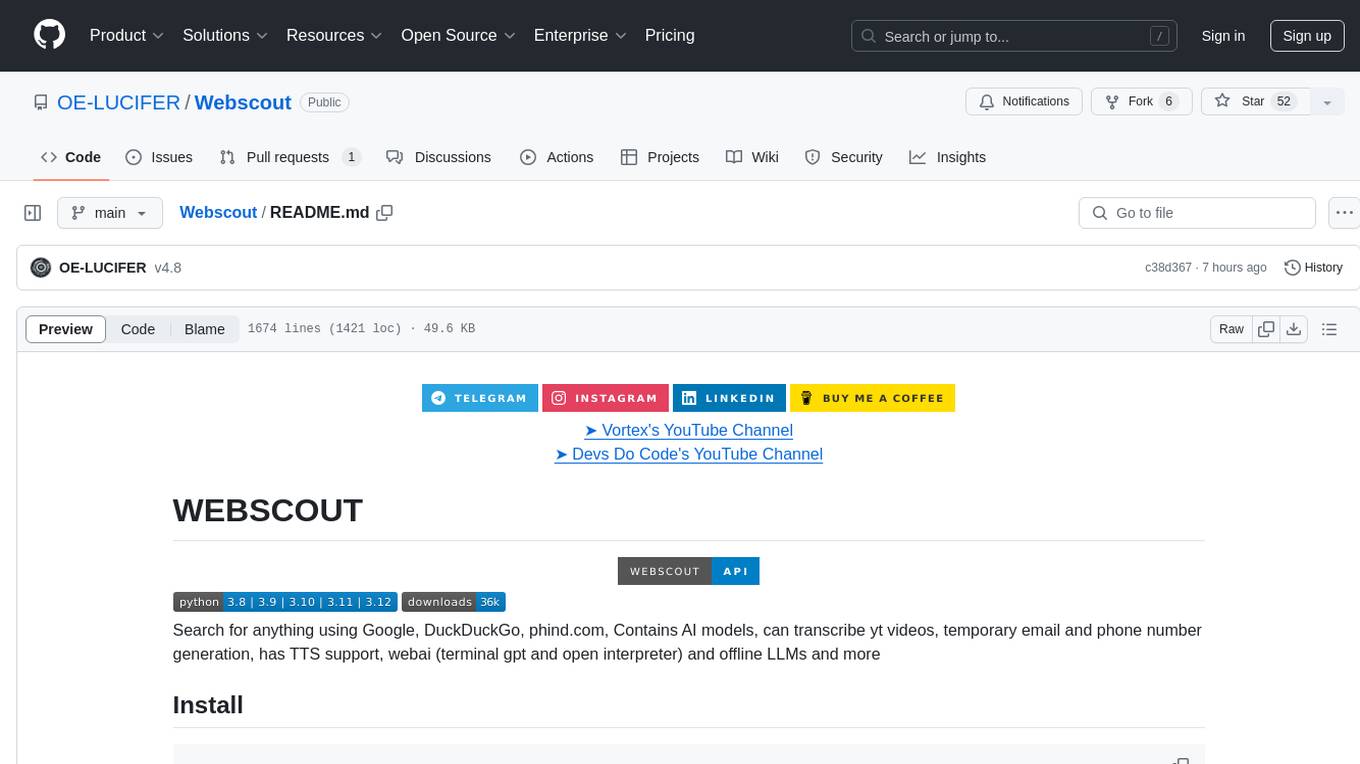
Webscout
WebScout is a versatile tool that allows users to search for anything using Google, DuckDuckGo, and phind.com. It contains AI models, can transcribe YouTube videos, generate temporary email and phone numbers, has TTS support, webai (terminal GPT and open interpreter), and offline LLMs. It also supports features like weather forecasting, YT video downloading, temp mail and number generation, text-to-speech, advanced web searches, and more.
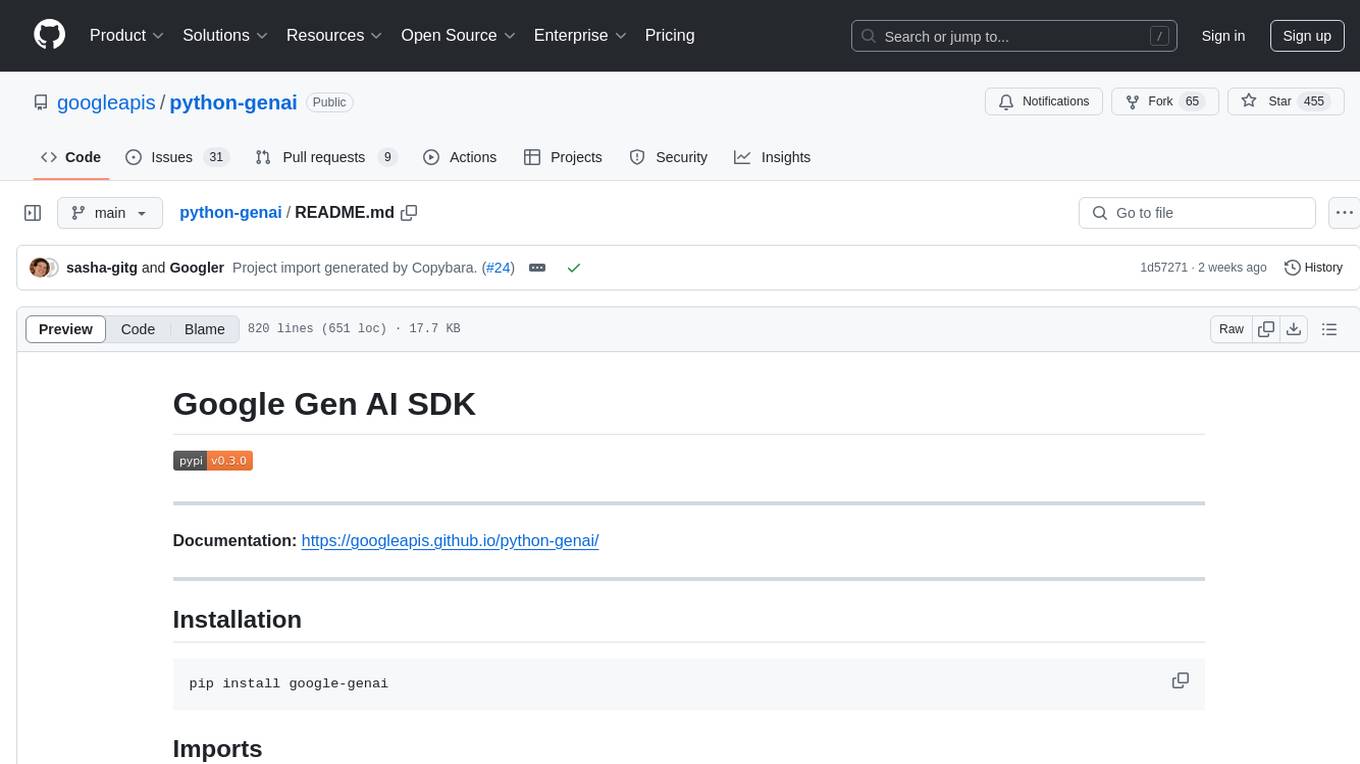
python-genai
The Google Gen AI SDK is a Python library that provides access to Google AI and Vertex AI services. It allows users to create clients for different services, work with parameter types, models, generate content, call functions, handle JSON response schemas, stream text and image content, perform async operations, count and compute tokens, embed content, generate and upscale images, edit images, work with files, create and get cached content, tune models, distill models, perform batch predictions, and more. The SDK supports various features like automatic function support, manual function declaration, JSON response schema support, streaming for text and image content, async methods, tuning job APIs, distillation, batch prediction, and more.

generative-ai-python
The Google AI Python SDK is the easiest way for Python developers to build with the Gemini API. The Gemini API gives you access to Gemini models created by Google DeepMind. Gemini models are built from the ground up to be multimodal, so you can reason seamlessly across text, images, and code.
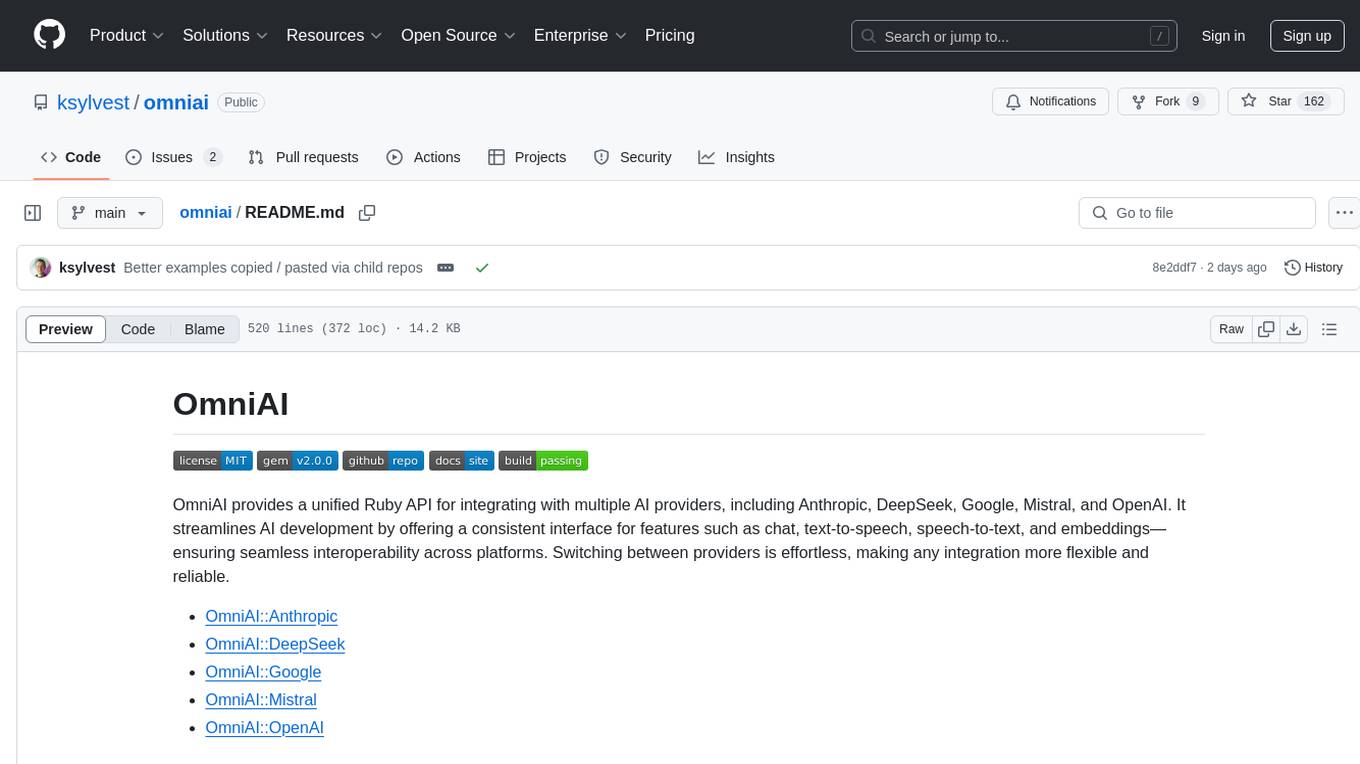
omniai
OmniAI provides a unified Ruby API for integrating with multiple AI providers, streamlining AI development by offering a consistent interface for features such as chat, text-to-speech, speech-to-text, and embeddings. It ensures seamless interoperability across platforms and effortless switching between providers, making integrations more flexible and reliable.
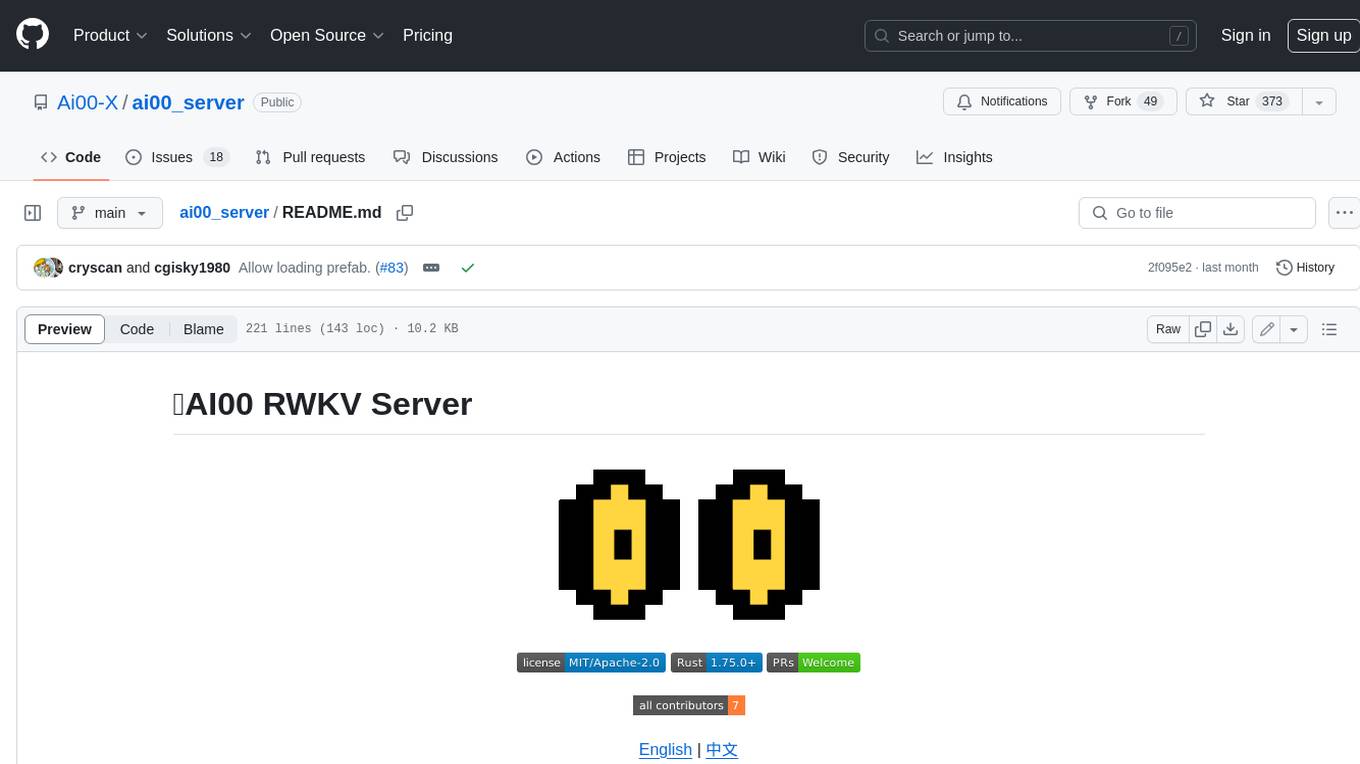
ai00_server
AI00 RWKV Server is an inference API server for the RWKV language model based upon the web-rwkv inference engine. It supports VULKAN parallel and concurrent batched inference and can run on all GPUs that support VULKAN. No need for Nvidia cards!!! AMD cards and even integrated graphics can be accelerated!!! No need for bulky pytorch, CUDA and other runtime environments, it's compact and ready to use out of the box! Compatible with OpenAI's ChatGPT API interface. 100% open source and commercially usable, under the MIT license. If you are looking for a fast, efficient, and easy-to-use LLM API server, then AI00 RWKV Server is your best choice. It can be used for various tasks, including chatbots, text generation, translation, and Q&A.
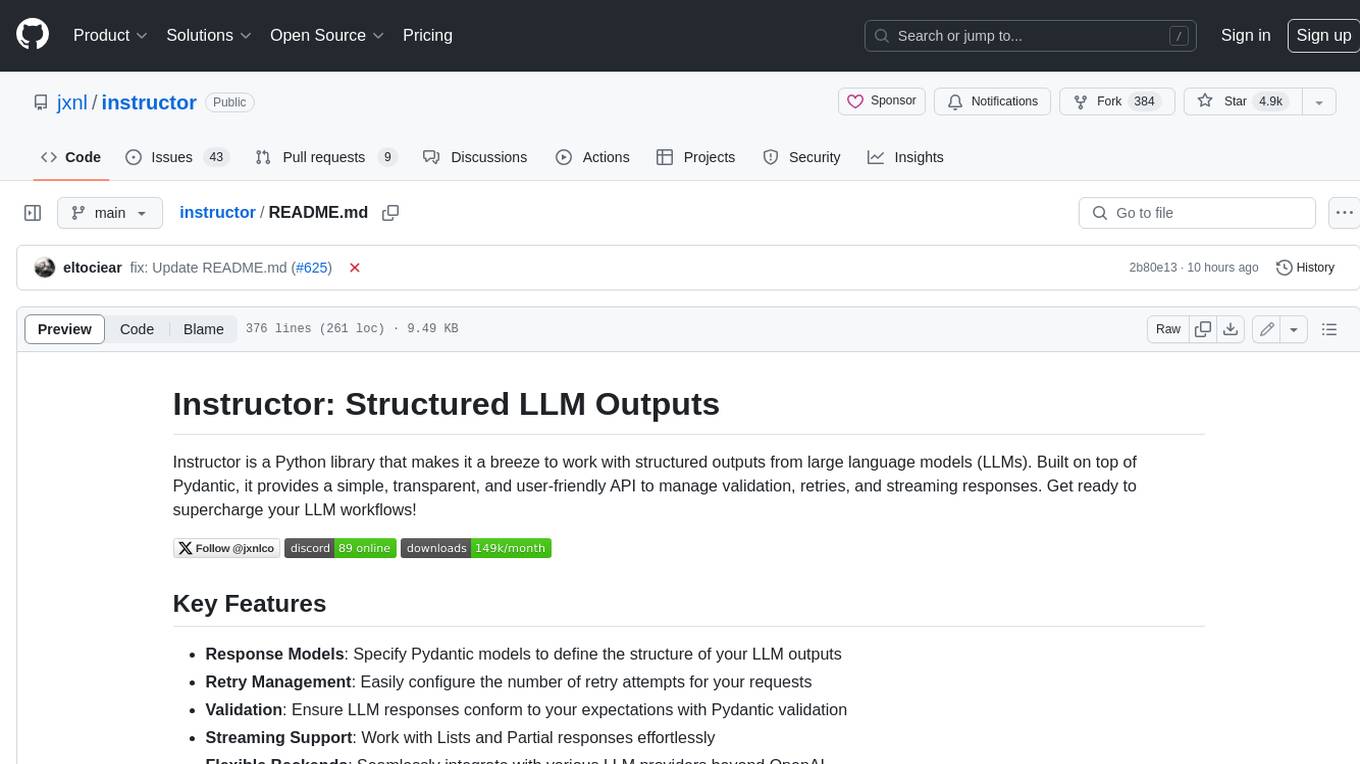
instructor
Instructor is a Python library that makes it a breeze to work with structured outputs from large language models (LLMs). Built on top of Pydantic, it provides a simple, transparent, and user-friendly API to manage validation, retries, and streaming responses. Get ready to supercharge your LLM workflows!
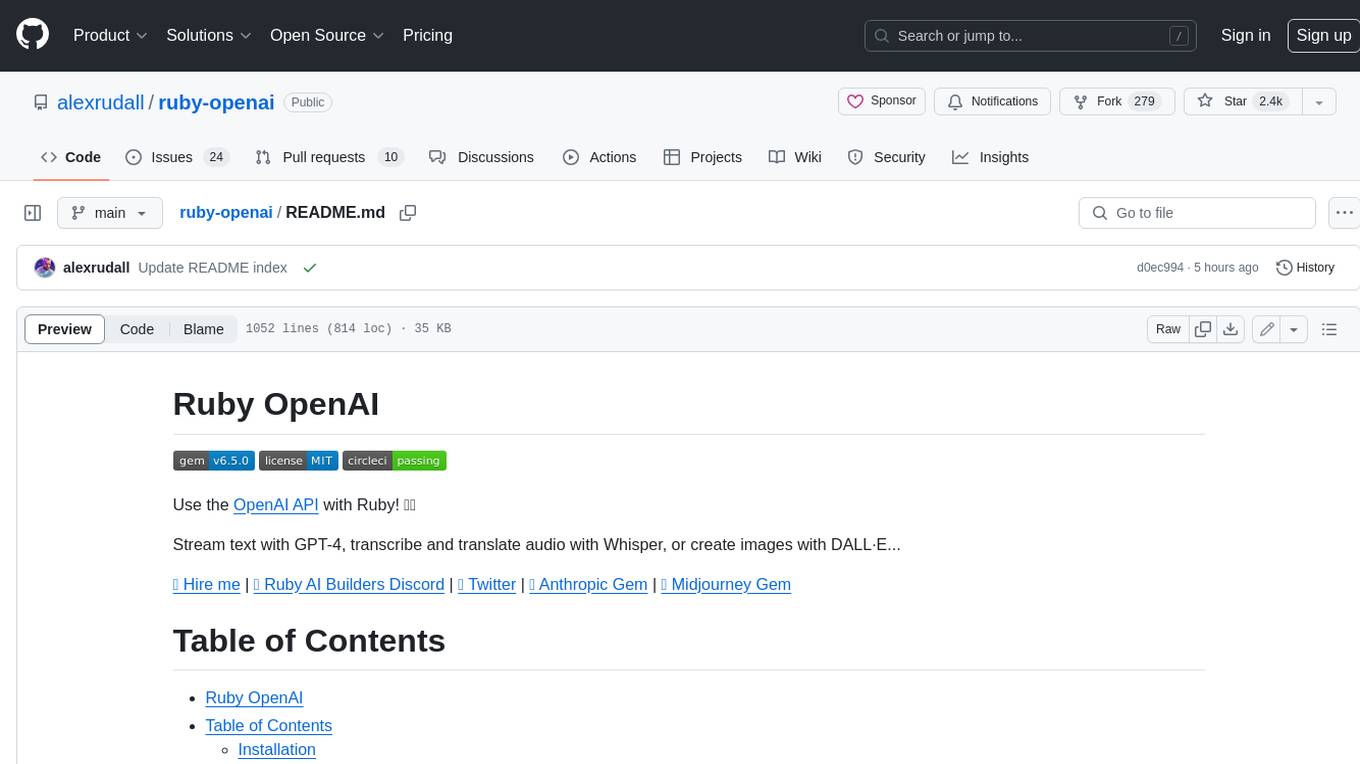
ruby-openai
Use the OpenAI API with Ruby! 🤖🩵 Stream text with GPT-4, transcribe and translate audio with Whisper, or create images with DALL·E... Hire me | 🎮 Ruby AI Builders Discord | 🐦 Twitter | 🧠 Anthropic Gem | 🚂 Midjourney Gem ## Table of Contents * Ruby OpenAI * Table of Contents * Installation * Bundler * Gem install * Usage * Quickstart * With Config * Custom timeout or base URI * Extra Headers per Client * Logging * Errors * Faraday middleware * Azure * Ollama * Counting Tokens * Models * Examples * Chat * Streaming Chat * Vision * JSON Mode * Functions * Edits * Embeddings * Batches * Files * Finetunes * Assistants * Threads and Messages * Runs * Runs involving function tools * Image Generation * DALL·E 2 * DALL·E 3 * Image Edit * Image Variations * Moderations * Whisper * Translate * Transcribe * Speech * Errors * Development * Release * Contributing * License * Code of Conduct
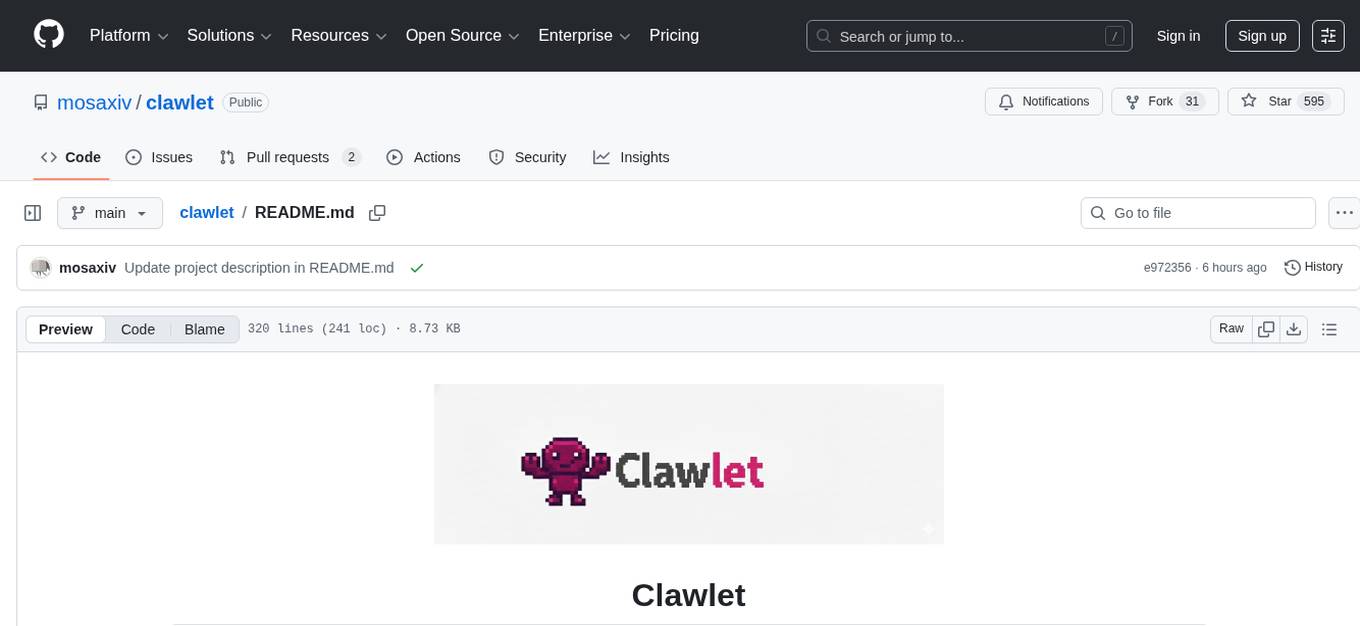
clawlet
Clawlet is an ultra-lightweight and efficient personal AI assistant that comes as a single binary with no CGO, runtime, or dependencies. It features hybrid semantic memory search and is inspired by OpenClaw and nanobot. Users can easily download Clawlet from GitHub Releases and drop it on any machine to enable memory search functionality. The tool supports various LLM providers like OpenAI, OpenRouter, Anthropic, Gemini, and local endpoints. Users can configure Clawlet for memory search setup and chat app integrations for platforms like Telegram, WhatsApp, Discord, and Slack. Clawlet CLI provides commands for initializing workspace, running the agent, managing channels, scheduling jobs, and more.
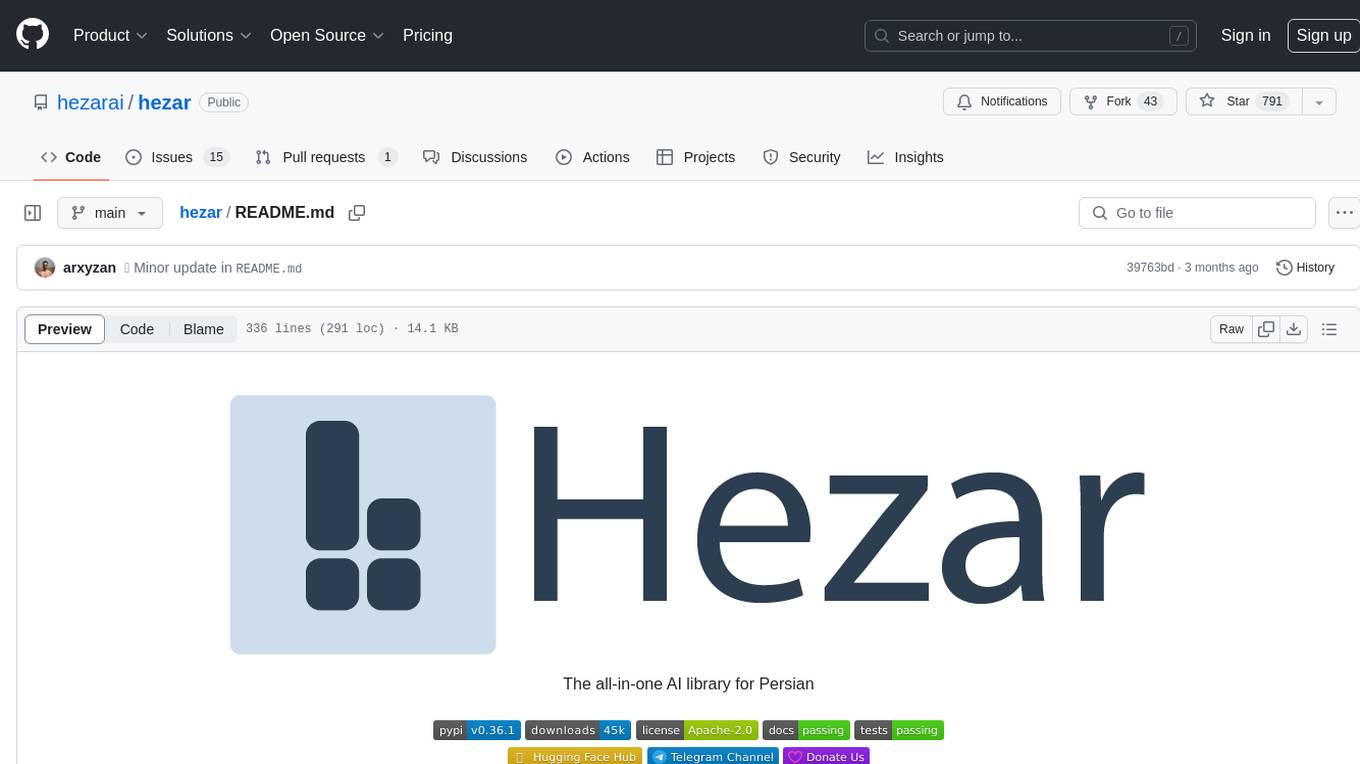
hezar
Hezar is an all-in-one AI library designed specifically for the Persian community. It brings together various AI models and tools, making it easy to use AI with just a few lines of code. The library seamlessly integrates with Hugging Face Hub, offering a developer-friendly interface and task-based model interface. In addition to models, Hezar provides tools like word embeddings, tokenizers, feature extractors, and more. It also includes supplementary ML tools for deployment, benchmarking, and optimization.
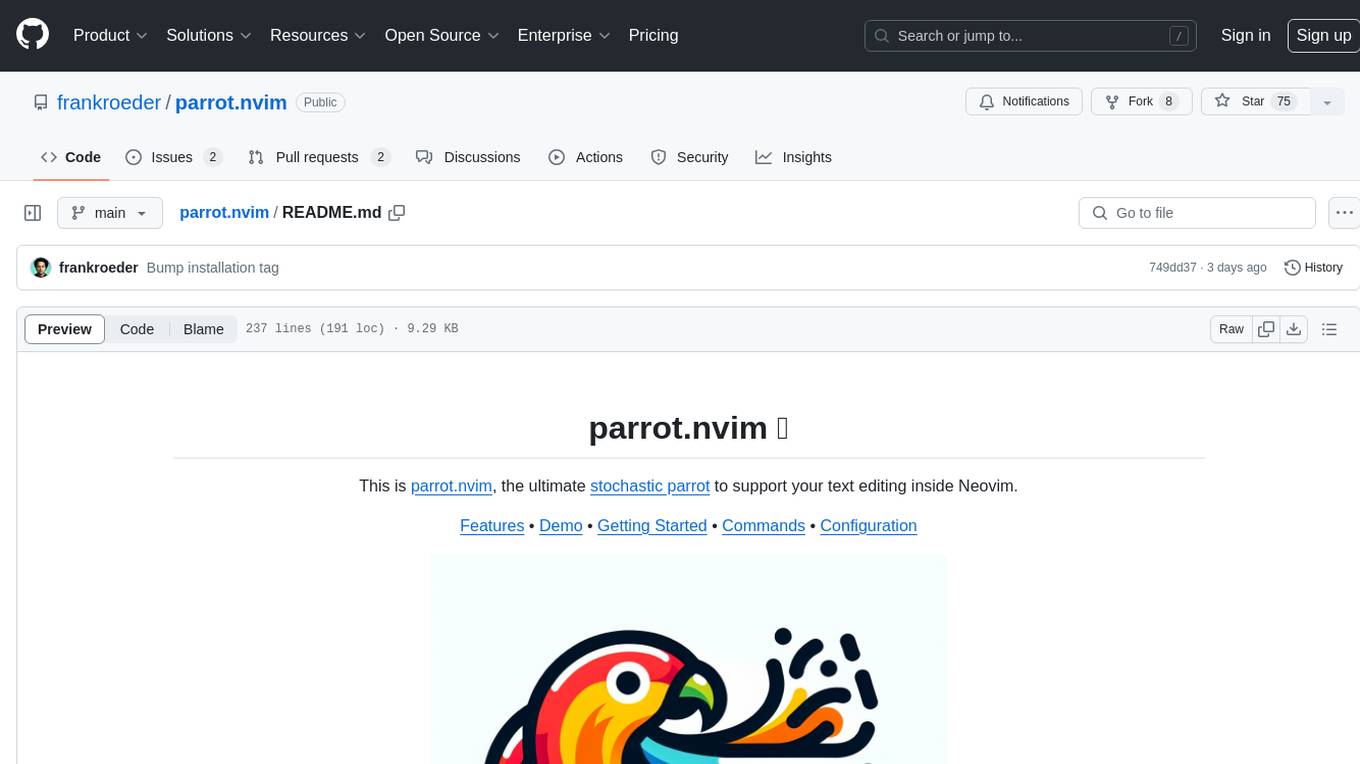
parrot.nvim
Parrot.nvim is a Neovim plugin that prioritizes a seamless out-of-the-box experience for text generation. It simplifies functionality and focuses solely on text generation, excluding integration of DALLE and Whisper. It supports persistent conversations as markdown files, custom hooks for inline text editing, multiple providers like Anthropic API, perplexity.ai API, OpenAI API, Mistral API, and local/offline serving via ollama. It allows custom agent definitions, flexible API credential support, and repository-specific instructions with a `.parrot.md` file. It does not have autocompletion or hidden requests in the background to analyze files.
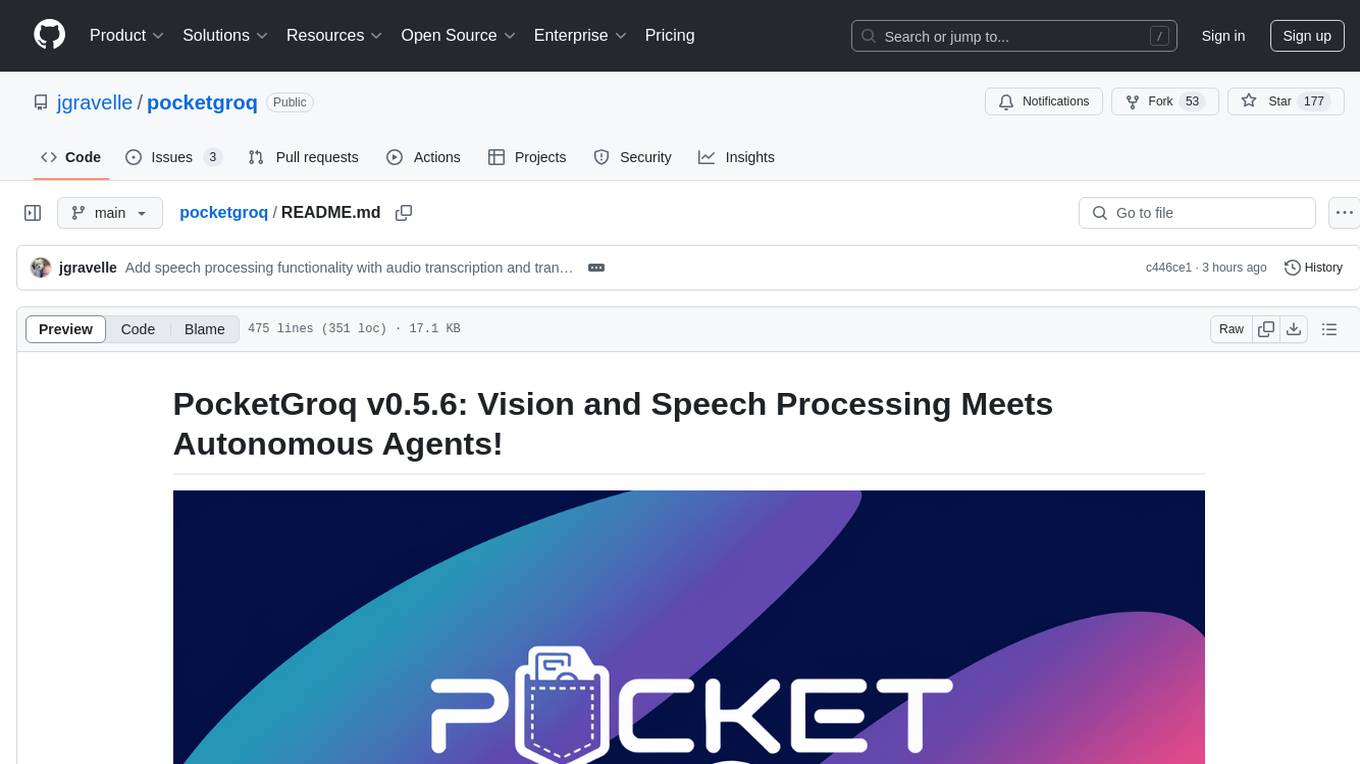
pocketgroq
PocketGroq is a tool that provides advanced functionalities for text generation, web scraping, web search, and AI response evaluation. It includes features like an Autonomous Agent for answering questions, web crawling and scraping capabilities, enhanced web search functionality, and flexible integration with Ollama server. Users can customize the agent's behavior, evaluate responses using AI, and utilize various methods for text generation, conversation management, and Chain of Thought reasoning. The tool offers comprehensive methods for different tasks, such as initializing RAG, error handling, and tool management. PocketGroq is designed to enhance development processes and enable the creation of AI-powered applications with ease.

lagent
Lagent is a lightweight open-source framework that allows users to efficiently build large language model(LLM)-based agents. It also provides some typical tools to augment LLM. The overview of our framework is shown below:
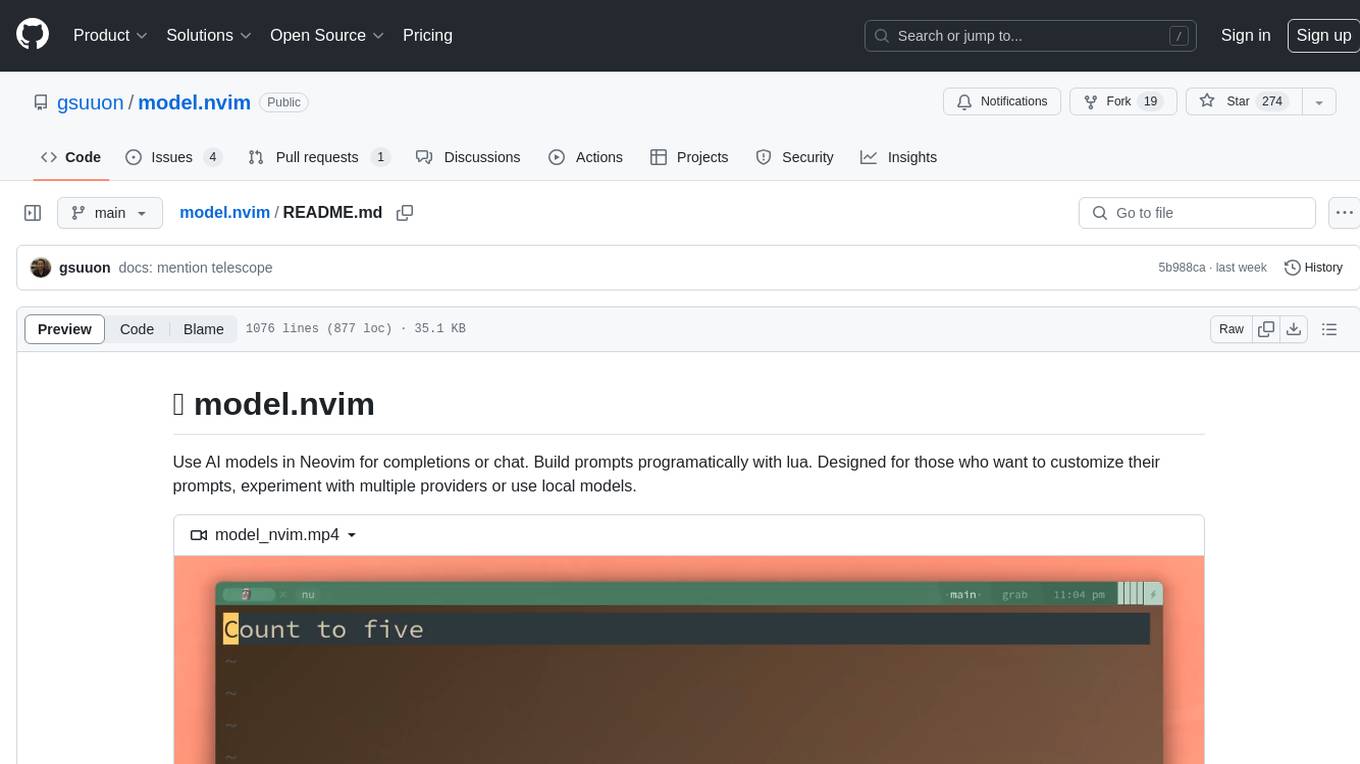
model.nvim
model.nvim is a tool designed for Neovim users who want to utilize AI models for completions or chat within their text editor. It allows users to build prompts programmatically with Lua, customize prompts, experiment with multiple providers, and use both hosted and local models. The tool supports features like provider agnosticism, programmatic prompts in Lua, async and multistep prompts, streaming completions, and chat functionality in 'mchat' filetype buffer. Users can customize prompts, manage responses, and context, and utilize various providers like OpenAI ChatGPT, Google PaLM, llama.cpp, ollama, and more. The tool also supports treesitter highlights and folds for chat buffers.
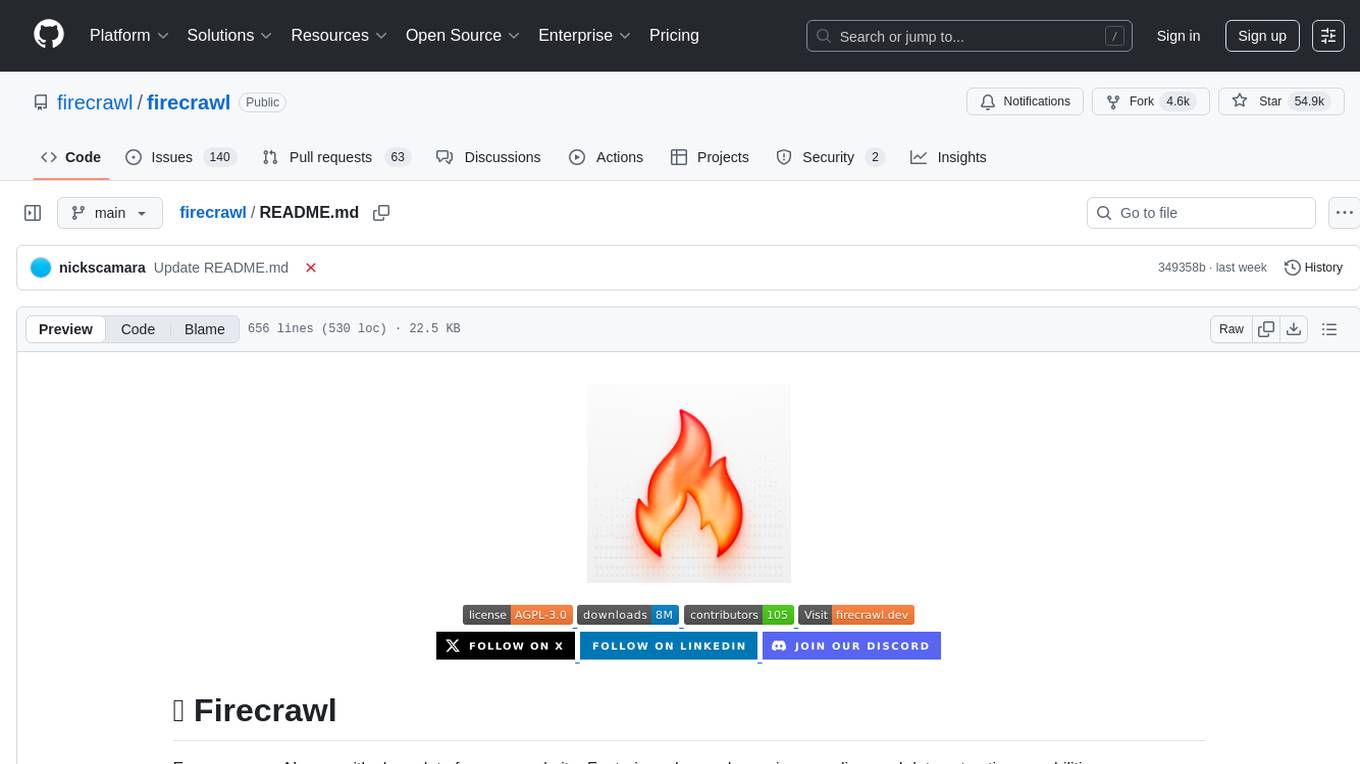
firecrawl
Firecrawl is an API service that empowers AI applications with clean data from any website. It features advanced scraping, crawling, and data extraction capabilities. The repository is still in development, integrating custom modules into the mono repo. Users can run it locally but it's not fully ready for self-hosted deployment yet. Firecrawl offers powerful capabilities like scraping, crawling, mapping, searching, and extracting structured data from single pages, multiple pages, or entire websites with AI. It supports various formats, actions, and batch scraping. The tool is designed to handle proxies, anti-bot mechanisms, dynamic content, media parsing, change tracking, and more. Firecrawl is available as an open-source project under the AGPL-3.0 license, with additional features offered in the cloud version.
For similar tasks
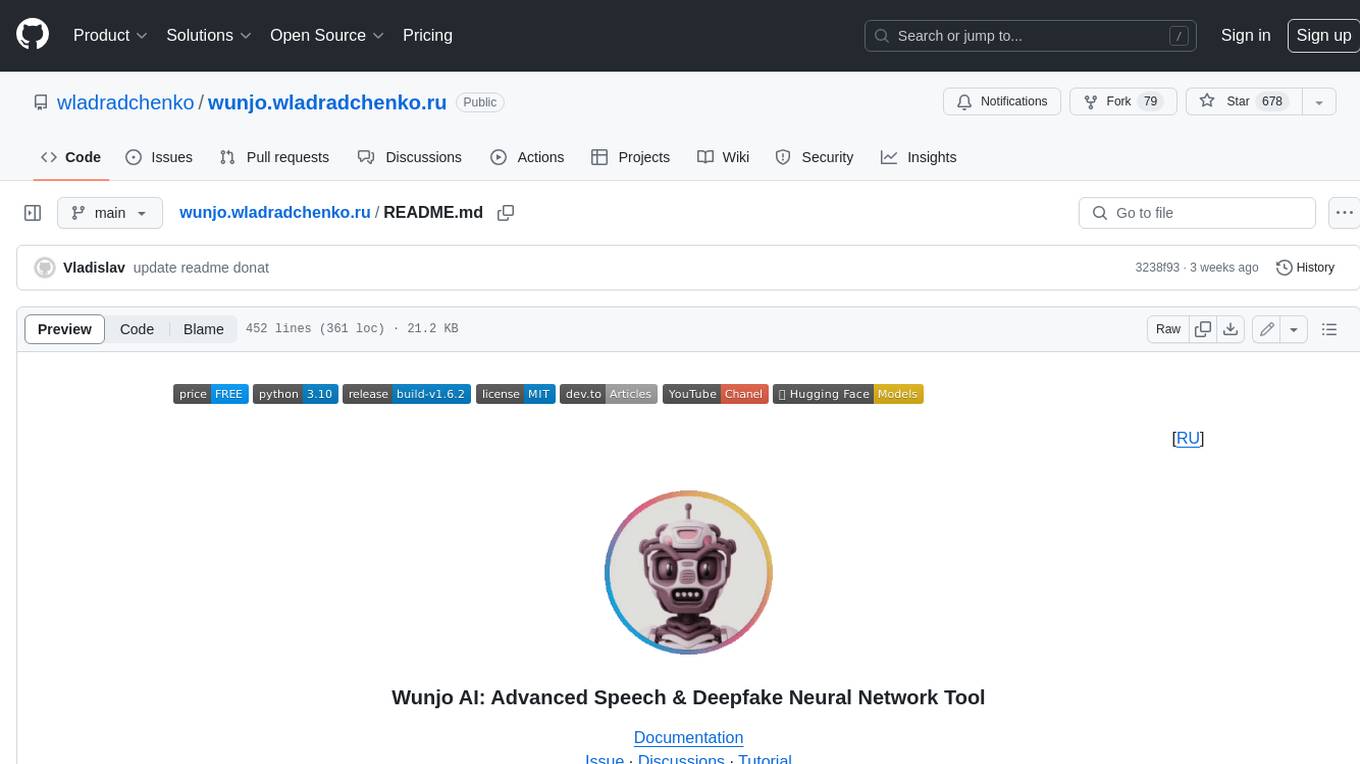
wunjo.wladradchenko.ru
Wunjo AI is a comprehensive tool that empowers users to explore the realm of speech synthesis, deepfake animations, video-to-video transformations, and more. Its user-friendly interface and privacy-first approach make it accessible to both beginners and professionals alike. With Wunjo AI, you can effortlessly convert text into human-like speech, clone voices from audio files, create multi-dialogues with distinct voice profiles, and perform real-time speech recognition. Additionally, you can animate faces using just one photo combined with audio, swap faces in videos, GIFs, and photos, and even remove unwanted objects or enhance the quality of your deepfakes using the AI Retouch Tool. Wunjo AI is an all-in-one solution for your voice and visual AI needs, offering endless possibilities for creativity and expression.
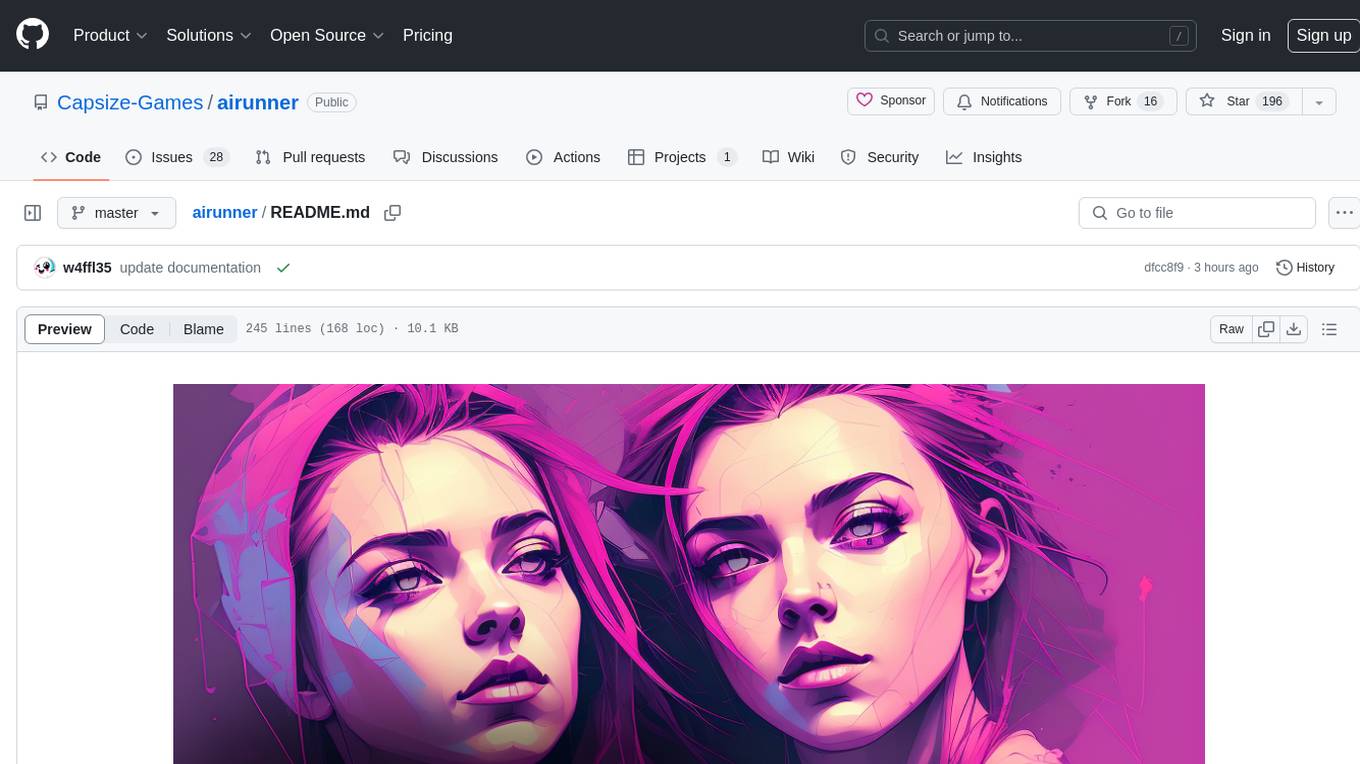
airunner
AI Runner is a multi-modal AI interface that allows users to run open-source large language models and AI image generators on their own hardware. The tool provides features such as voice-based chatbot conversations, text-to-speech, speech-to-text, vision-to-text, text generation with large language models, image generation capabilities, image manipulation tools, utility functions, and more. It aims to provide a stable and user-friendly experience with security updates, a new UI, and a streamlined installation process. The application is designed to run offline on users' hardware without relying on a web server, offering a smooth and responsive user experience.
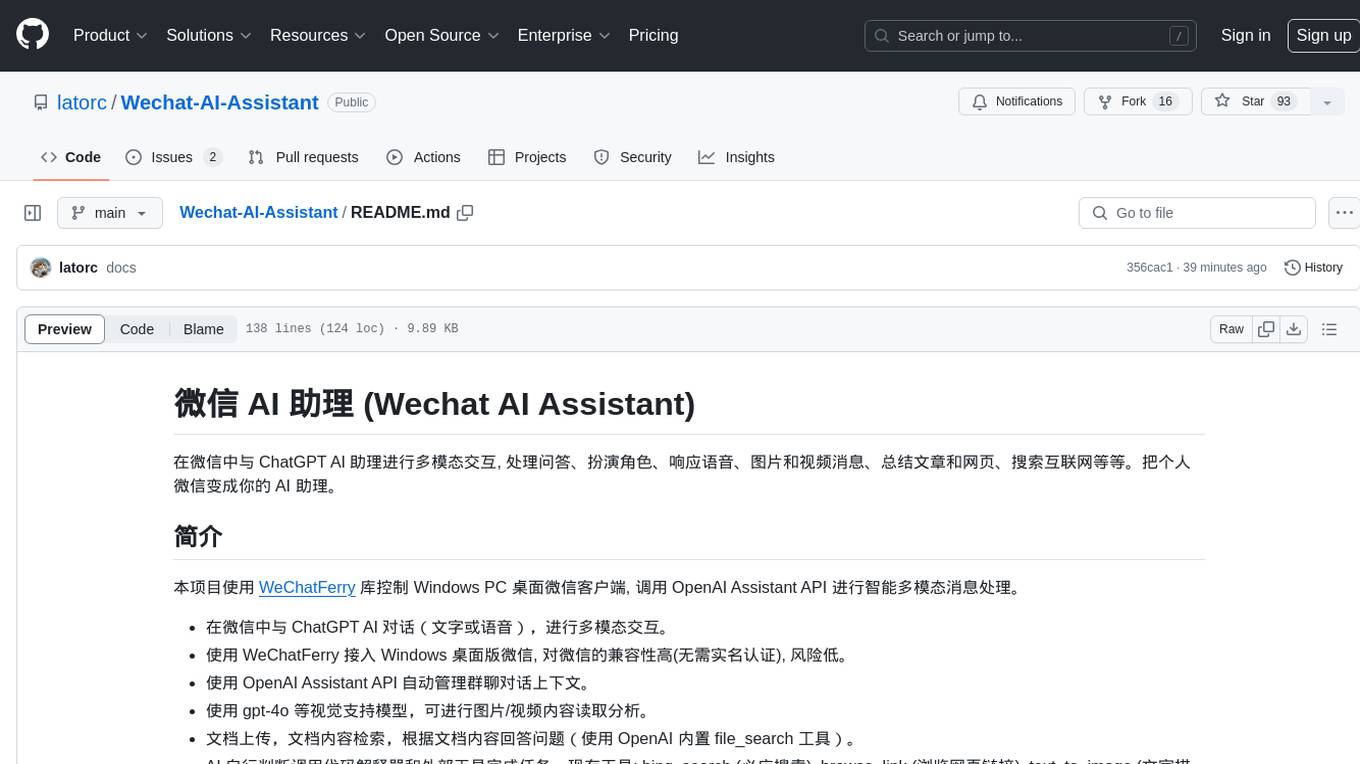
Wechat-AI-Assistant
Wechat AI Assistant is a project that enables multi-modal interaction with ChatGPT AI assistant within WeChat. It allows users to engage in conversations, role-playing, respond to voice messages, analyze images and videos, summarize articles and web links, and search the internet. The project utilizes the WeChatFerry library to control the Windows PC desktop WeChat client and leverages the OpenAI Assistant API for intelligent multi-modal message processing. Users can interact with ChatGPT AI in WeChat through text or voice, access various tools like bing_search, browse_link, image_to_text, text_to_image, text_to_speech, video_analysis, and more. The AI autonomously determines which code interpreter and external tools to use to complete tasks. Future developments include file uploads for AI to reference content, integration with other APIs, and login support for enterprise WeChat and WeChat official accounts.
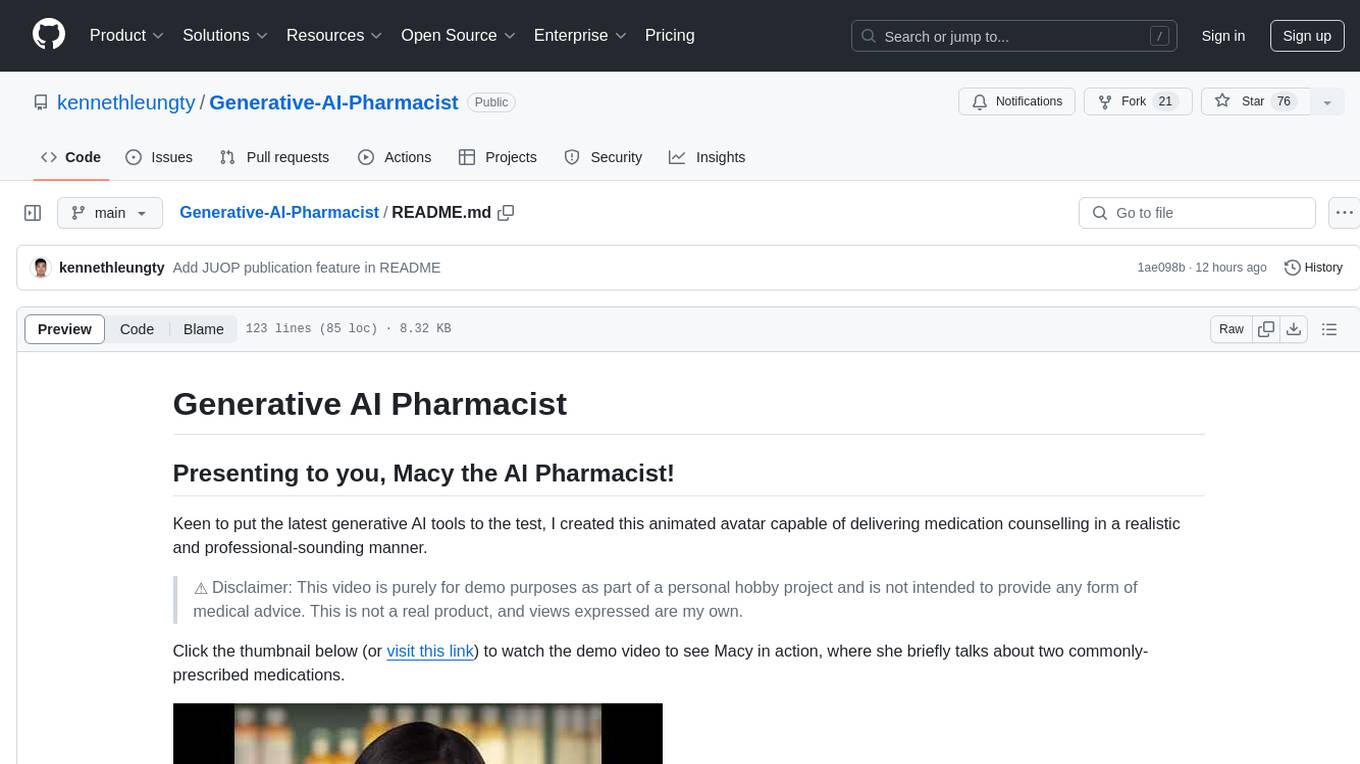
Generative-AI-Pharmacist
Generative AI Pharmacist is a project showcasing the use of generative AI tools to create an animated avatar named Macy, who delivers medication counseling in a realistic and professional manner. The project utilizes tools like Midjourney for image generation, ChatGPT for text generation, ElevenLabs for text-to-speech conversion, and D-ID for creating a photorealistic talking avatar video. The demo video featuring Macy discussing commonly-prescribed medications demonstrates the potential of generative AI in healthcare communication.
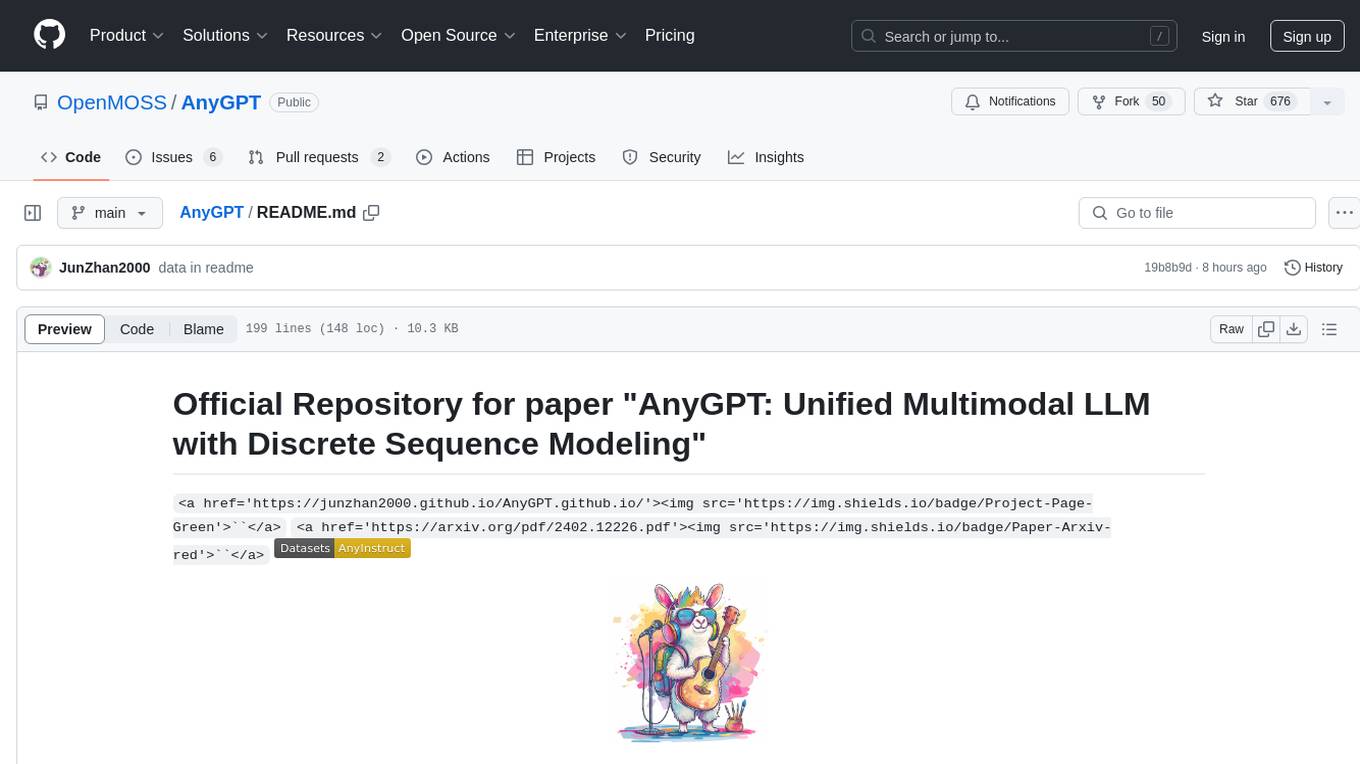
AnyGPT
AnyGPT is a unified multimodal language model that utilizes discrete representations for processing various modalities like speech, text, images, and music. It aligns the modalities for intermodal conversions and text processing. AnyInstruct dataset is constructed for generative models. The model proposes a generative training scheme using Next Token Prediction task for training on a Large Language Model (LLM). It aims to compress vast multimodal data on the internet into a single model for emerging capabilities. The tool supports tasks like text-to-image, image captioning, ASR, TTS, text-to-music, and music captioning.
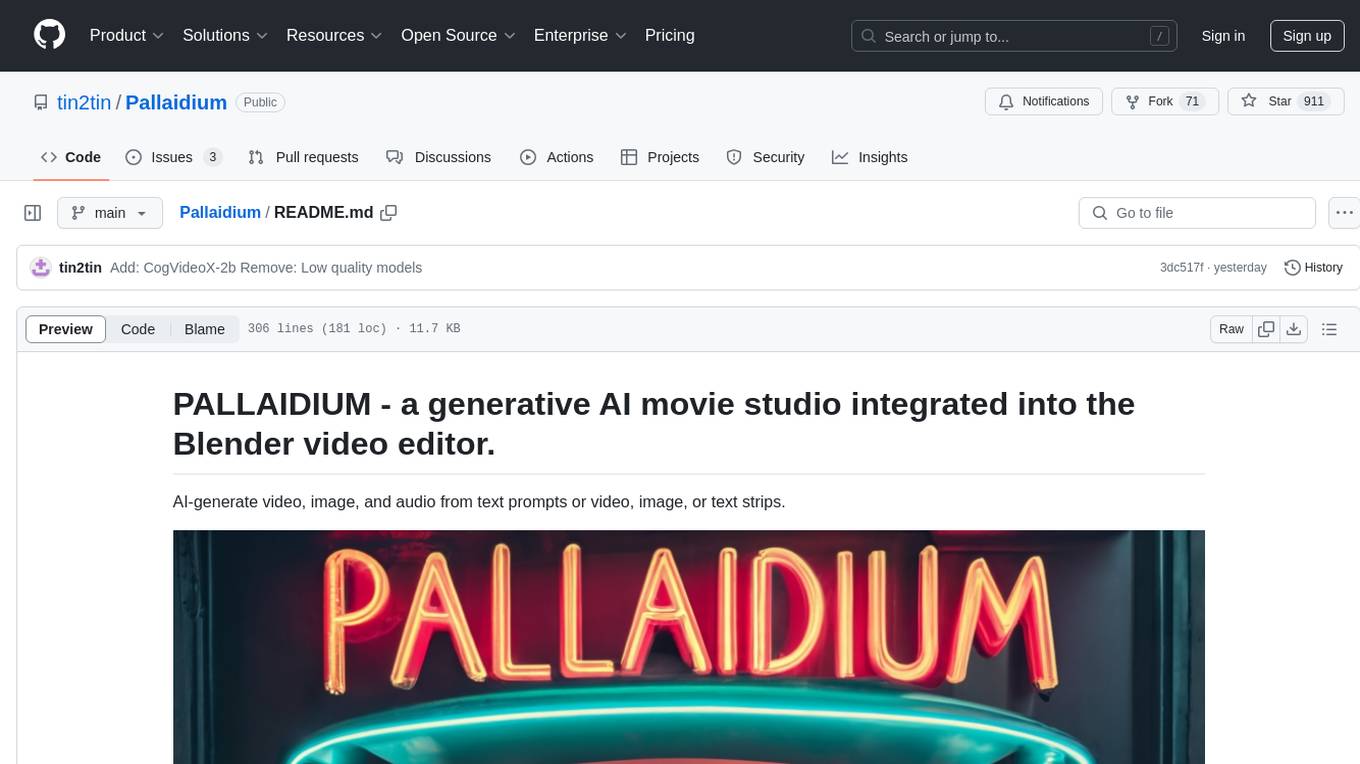
Pallaidium
Pallaidium is a generative AI movie studio integrated into the Blender video editor. It allows users to AI-generate video, image, and audio from text prompts or existing media files. The tool provides various features such as text to video, text to audio, text to speech, text to image, image to image, image to video, video to video, image to text, and more. It requires a Windows system with a CUDA-supported Nvidia card and at least 6 GB VRAM. Pallaidium offers batch processing capabilities, text to audio conversion using Bark, and various performance optimization tips. Users can install the tool by downloading the add-on and following the installation instructions provided. The tool comes with a set of restrictions on usage, prohibiting the generation of harmful, pornographic, violent, or false content.
ElevenLabs-DotNet
ElevenLabs-DotNet is a non-official Eleven Labs voice synthesis RESTful client that allows users to convert text to speech. The library targets .NET 8.0 and above, working across various platforms like console apps, winforms, wpf, and asp.net, and across Windows, Linux, and Mac. Users can authenticate using API keys directly, from a configuration file, or system environment variables. The tool provides functionalities for text to speech conversion, streaming text to speech, accessing voices, dubbing audio or video files, generating sound effects, managing history of synthesized audio clips, and accessing user information and subscription status.

omniai
OmniAI provides a unified Ruby API for integrating with multiple AI providers, streamlining AI development by offering a consistent interface for features such as chat, text-to-speech, speech-to-text, and embeddings. It ensures seamless interoperability across platforms and effortless switching between providers, making integrations more flexible and reliable.
For similar jobs

sweep
Sweep is an AI junior developer that turns bugs and feature requests into code changes. It automatically handles developer experience improvements like adding type hints and improving test coverage.

teams-ai
The Teams AI Library is a software development kit (SDK) that helps developers create bots that can interact with Teams and Microsoft 365 applications. It is built on top of the Bot Framework SDK and simplifies the process of developing bots that interact with Teams' artificial intelligence capabilities. The SDK is available for JavaScript/TypeScript, .NET, and Python.

ai-guide
This guide is dedicated to Large Language Models (LLMs) that you can run on your home computer. It assumes your PC is a lower-end, non-gaming setup.

classifai
Supercharge WordPress Content Workflows and Engagement with Artificial Intelligence. Tap into leading cloud-based services like OpenAI, Microsoft Azure AI, Google Gemini and IBM Watson to augment your WordPress-powered websites. Publish content faster while improving SEO performance and increasing audience engagement. ClassifAI integrates Artificial Intelligence and Machine Learning technologies to lighten your workload and eliminate tedious tasks, giving you more time to create original content that matters.

chatbot-ui
Chatbot UI is an open-source AI chat app that allows users to create and deploy their own AI chatbots. It is easy to use and can be customized to fit any need. Chatbot UI is perfect for businesses, developers, and anyone who wants to create a chatbot.

BricksLLM
BricksLLM is a cloud native AI gateway written in Go. Currently, it provides native support for OpenAI, Anthropic, Azure OpenAI and vLLM. BricksLLM aims to provide enterprise level infrastructure that can power any LLM production use cases. Here are some use cases for BricksLLM: * Set LLM usage limits for users on different pricing tiers * Track LLM usage on a per user and per organization basis * Block or redact requests containing PIIs * Improve LLM reliability with failovers, retries and caching * Distribute API keys with rate limits and cost limits for internal development/production use cases * Distribute API keys with rate limits and cost limits for students

uAgents
uAgents is a Python library developed by Fetch.ai that allows for the creation of autonomous AI agents. These agents can perform various tasks on a schedule or take action on various events. uAgents are easy to create and manage, and they are connected to a fast-growing network of other uAgents. They are also secure, with cryptographically secured messages and wallets.

griptape
Griptape is a modular Python framework for building AI-powered applications that securely connect to your enterprise data and APIs. It offers developers the ability to maintain control and flexibility at every step. Griptape's core components include Structures (Agents, Pipelines, and Workflows), Tasks, Tools, Memory (Conversation Memory, Task Memory, and Meta Memory), Drivers (Prompt and Embedding Drivers, Vector Store Drivers, Image Generation Drivers, Image Query Drivers, SQL Drivers, Web Scraper Drivers, and Conversation Memory Drivers), Engines (Query Engines, Extraction Engines, Summary Engines, Image Generation Engines, and Image Query Engines), and additional components (Rulesets, Loaders, Artifacts, Chunkers, and Tokenizers). Griptape enables developers to create AI-powered applications with ease and efficiency.











